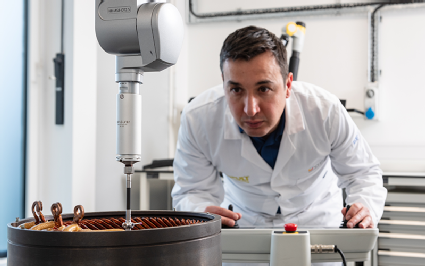WMG News - Latest news from WMG
Over 90% of engineering research at the University of Warwick recognised as world-leading or internationally excellent by the Research Excellence Framework

The high quality of engineering research at the University of Warwick has been recognised within the results of the 2021 Research Excellence Framework (REF), which were made publicly available today.
The University’s engineering research has been ranked 20th out of 89 UK institutions (according to Times Higher Education), with over 90% of engineering research outputs being identified as world-leading or internationally excellent.
Colleagues from research, technical services, teaching and professional services at WMG and the School of Engineering combined to create a strong submission within the ‘B12 Engineering’ category, augmented by related research from the Department of Physics.
Reflecting on the results, Professor Robin Clark, Dean of WMG and Director of Education said: “With 93% of our engineering research rated world leading or internationally excellent, the joint submission with our colleagues in the School of Engineering demonstrates the quality and breadth of work being undertaken at the University.
“Covering a diverse range of topics and delivering cross disciplinary research to address global and industrial challenges is something we and our industry partners value, and it is something we will develop further in the future.”
Professor David Towers, Head of the School of Engineering added: “The results show strong positive progression in research outputs and impact case studies. Most notably, we have – and are continuing – to invest in research infrastructure, in clean energy technologies, biomedical engineering and sustainable cities with a core strength in predictive modelling, the majority of which is ranked as world-leading. Hence, we are optimistic of our potential to further expand our academic and societal impact over the coming years together with our industry partners.”
The collective submission acknowledged the work of the University’s engineering-based researchers, spanning key areas such as: embedding sustainability through energy innovation; helping people live longer and healthier lives through biomedical engineering; realising visions for future cities; maximising the potential of technology and society; and embedding innovation throughout materials and manufacturing.
As part of this, a series of case studies were submitted to illustrate the breadth and depth of impact generated throughout engineering research at the University. Over 60% of these case studies have received the highest rank of ‘world-leading’.
Professor Paul Jennings, Director of Research at WMG commented: "Our research constantly evolves to address the needs of our industry partners across many sectors. So, to achieve this recognition for its quality and impact, especially during a period of significant growth and change, is testament to the capability and hard work of colleagues across the whole of our department."
The REF is the UK’s system designed to evaluate the quality of research across higher education. The assessment is conducted by Research England (as well as equivalent funding bodies for institutions across Scotland, Wales and Northern Ireland) through a process of expert review by academics, international members and research users.
WMG’s contribution within the submission involved significant partnership with industry and public bodies. The technical focus has evolved since REF 2014, to cover key themes such as vehicle electrification; sustainable materials; resilient manufacturing; and opportunities from improved use of data and connectivity. WMG's research also informs its education provision and skills programmes, as well as the national agenda, through initiatives like the National Electrification Skills Framework.
The School of Engineering spans Civil Engineering, Mechanical, Materials and Process Engineering, Electrical and Electronic Engineering, and Systems and Information Engineering, embedded within a single unified department to enable cross-fertilisation in research.
The results also recognised an increase in the economic and societal impact of the University’s research as a whole, which highlights the real-world benefit of the University’s work.
Commenting on the REF2021 assessment, Professor Stuart Croft, Vice-Chancellor at the University of Warwick, said: “These results demonstrate the truly world class quality of our research, our approach and most importantly our people.
“This is an outstanding achievement and a source of tremendous pride for everyone connected with this great institution.
“Our research has always been driven by a strong sense of purpose and commitment to ensuring what we do has a positive impact on wider society. From helping to save lives through our modelling work during the Covid pandemic, and the development of new, sustainable forms of transport and energy, to making a fairer criminal justice system, and supporting our cultural institutions and creative industries, our research delivers real-world benefit.
“Overall, the REF results also reflect the remarkable strength, quality and breadth of research within the UK. The future for our researchers is bright and exciting. We will continue to push boundaries, innovate and learn through our research work so we can benefit more people, in more places, more often.”
Read more about WMG’s research impact here and find out more about WMG’s REF submission here.
Read more about the School of Engineering’s research impact here and more about their REF submission here.
Read more about the University’s research impact and innovation here. The University’s announcement can be viewed here.
